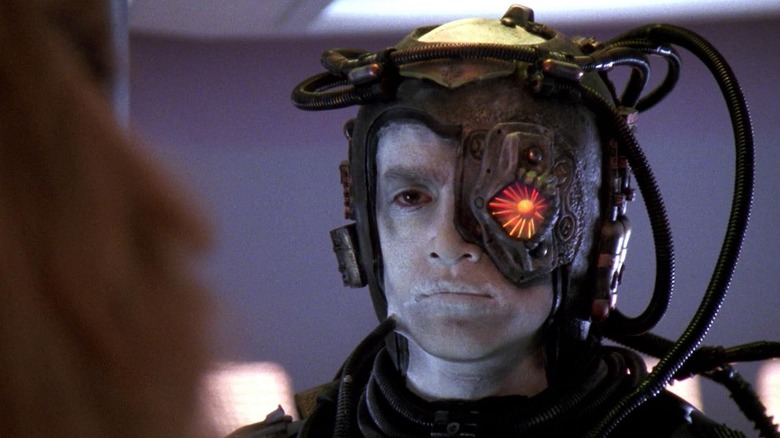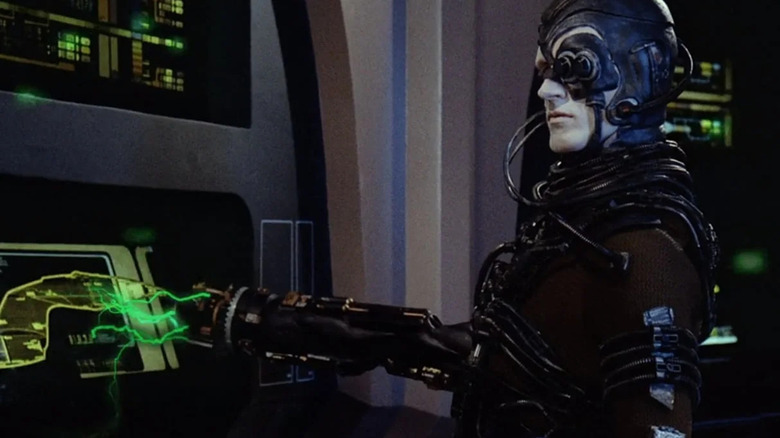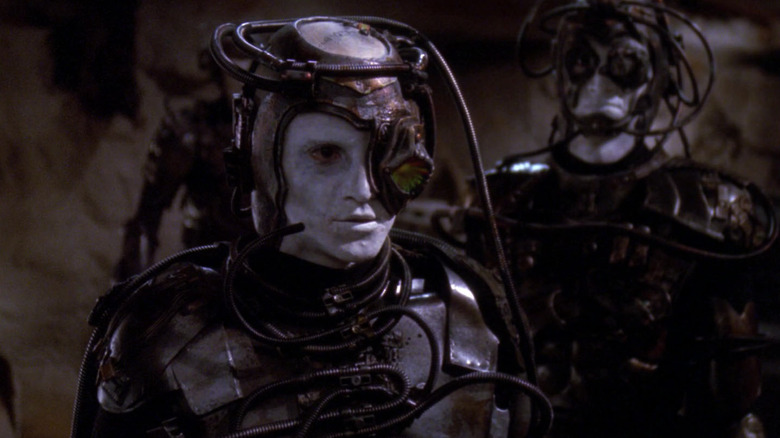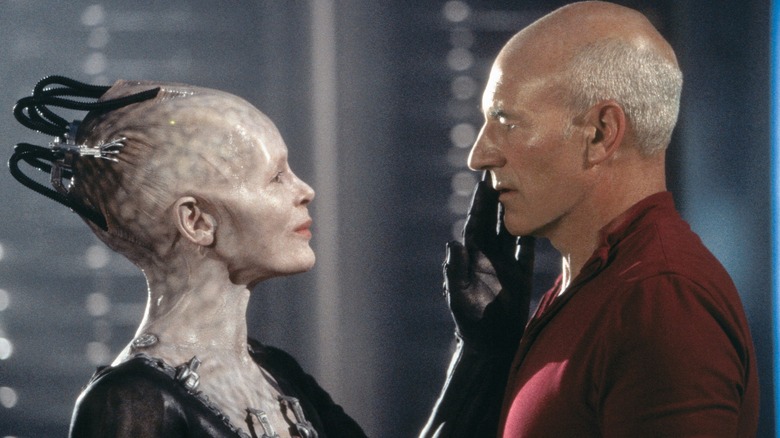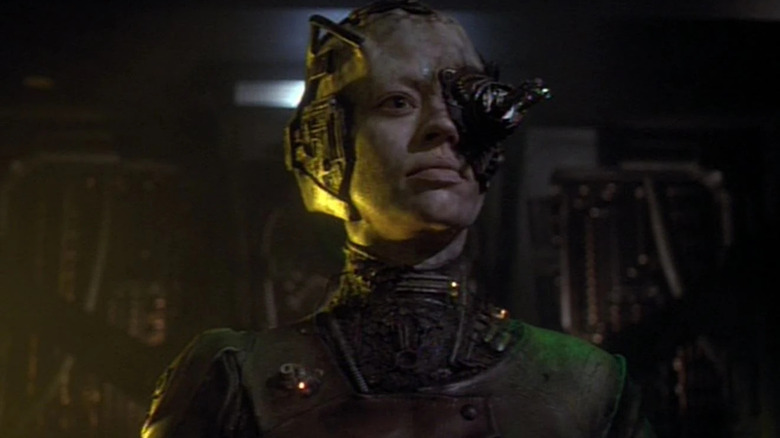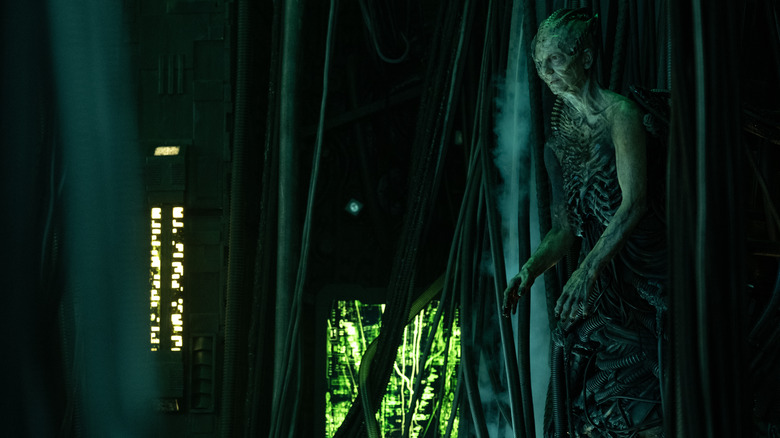The Borg Were The Best Star Trek Villains – Until They Weren't
On "Star Trek: The Next Generation," the Borg were first introduced in the second season episode "Q Who" (May 8, 1989). In the episode, the malevolent, all-power space imp Q (John De Lancie) offered his magical powers to Captain Picard (Patrick Stewart), knowing that Starfleet will likely encounter things that his puny human mind couldn't handle. When Picard politely refuses, Q throws the Enterprise-D thousands of lightyears away, landing it right in the path of a mysterious and enormous cube-shaped spacecraft. This was a ship belonging to the Borg, a species of cyborgs that share a single consciousness. The people inside have no free will and operate in service of the collective. They have been augmented with machinery and do not speak. When one dies, another merely takes its place. The Borg can travel at unbelievable speeds and can steal and incorporate technology into themselves. As Q describes them, they are the ultimate users. They see nothing in the galaxy but raw materials to steal and exploit.
Like slasher movie villains, the Borg couldn't be reasoned with. They had no negotiable agenda. And, also like a slasher movie villain, they sustained injury and kept on moving forward. They were unfazed by pain. What was their origin? What was their goal? These were mysteries that Picard and his crew would never uncover. After a few failed attempts to communicate, and losing lives to the Borg attack, Picard fled. He admitted that he needed Q's help. The Borg were too much.
Picard ultimately found the encounter to be a reminder not to be complacent. There are going to be terrors in the galaxy no one will be prepared for. It's a chilling episode and one of the best from "The Next Generation." The Borg were Michael Myers by way of H.R. Giger.
And it was good for a moment
The Borg were so terrifying in "Q Who" that the writers of "Star Trek: The Next Generation" would have to bring them back eventually. "Q Who" ended with the implication that the Borg, while thousands of lightyears away, were going to be traveling to get the Enterprise and complete its job of assimilation. The specter of the Borg hung over the series for a while. Then, at the end of the show's third season, audiences were treated to "The Best of Both Worlds" (June 18 and September 24, 1990), perhaps the show's most famous installment. In the cliffhanger two-part episode, Picard was kidnapped and assimilated by the Borg. His knowledge was siphoned out of his brain, and the Borg used it to attack Earth. Captain Riker (Jonathan Frakes) underwent a career crisis as a result, having to take command of the Enterprise. Thousands of lives were lost before Picard could be rescued and the Borg stopped.
After that, it seemed like the show was done with the Borg. The unstoppable threat had been stopped, but many died and Picard was forever traumatized. In the show's following episode, "Family," Picard admitted to his brother that the Borg hurt him more deeply than anyone can imagine. Picard broke down, something he rarely did. It seems that the trauma lingered.
But the writers couldn't stay away from the Borg, and in many ways, it's been downhill ever since. With every new reappearance of the famed "Star Trek" villains came a twist in their ethos, an alteration or expansion of what was known before. And each new twist made the Borg less threatening.
Yes, I am an old Trekkie shaking his fist at a cloud, but one could argue that the Borg were never more threatening than they were 33 years ago.
I, Borg and Descent
The Borg returned in an episode called "I, Borg" (May 10, 1992). It seems a small Borg ship carrying only five drones crashed on an uninhabited planet. One drone survived and the Enterprise took it on board to study it. They find that the drone (Jonathan De Arco), once separated from its central collective, begins to regain its sense of individuality. Not his identity prior to assimilation, mind you, but a new sense of self-awareness. Geordi (LeVar Burton) names the drone Hugh. The Enterprise finds a way to implant a program into Hugh's brain that, when reintroduced to the collective, would destroy them. This becomes unethical, however, in light of Hugh's rediscovered sense of agency. Hugh chooses to be re-assimilated, but a last-minute twist reveals that the Borg are unable to re-assimilate him.
This twist would lead directly into the tiresome two-parter "Descent" (June 21 and September 20, 1993) when Hugh's individuality spread to other drones, leaving them aimless and in need of a leader. Lore (Brent Spiner) stepped in to form a Borg cult. It's a bad episode. Also, if the Borg can assimilate people with free will, why can't they re-assimilate drones with free will? Certainly, a hard reboot is part of their program?
The notion that the Borg could be rescued from assimilation by merely isolating them made their mysterious culture of ultimate consumption less permanent and hence less threatening. It also cheapened Picard's survival. If anyone can survive, then rescuing Picard became something easily replicated. That Lore could then step in and manipulate the Borg meant they had no real motivation to attack. As villains, they lost a lot of their edge.
First Contact
Then, in 1996, the Borg were dealt what was, to my mind, their death blow. Jonathan Frakes' feature film "Star Trek: First Contact" featured a Borg ship that traveled back in time to the eve of Earth's First Contact in 2063. First Contact with the Vulcans was a monumental occasion for Earth and the catalyst that would usher in planetary change toward peace centuries later. The Borg, rather confoundingly, decided that they wanted to halt the formation of the Federation. Their motivation for halting this particular event is never explained. If it was assimilation and destruction they wanted, why not go back to 1940? Or, heck, why not 2.4 million years ago? Assimilate humanity when they were still proto-human? By choosing this date in particular, the Borg suddenly had a purpose, a scheme. A scheme indicates that the Borg is calculating. And if they can calculate, their motives are negotiable.
Additionally, "First Contact" introduced the notion of a Borg Queen (Alice Krige), a free-willed commander for the Borg. She is a very human character who has desires and motivations. She seduces Data (Spiner) and claims to want Picard as a mate. The idea that the Borg were a soulless race of all-consuming machines is now long gone, having been replaced by something more wicked and malevolent. Even the design of the Borg changed into something more sinewy and less mechanical. The Borg ships are now warm, steamy places, and the Borg themselves are veiny and scowly. "First Contact" turned them into action movie terrorists. What a snore.
From there, it's been a gradual softening of the Borg to the point where they are a mere inconvenience, rather than an unstoppable threat.
Voyager and beyond
The Borg played a major role in "Star Trek: Voyager," as the titular ship found itself needing to travel through Borg-owned space. That the Borg would have their own territory handily contradicts what had been known about them up to that point. Did they negotiate a treaty? Surely the Borg wouldn't care for property, but merely travel out and assimilate, right? No, it seems that ownership of certain technologies is important to them. At the end of the third season of "Voyager," Captain Janeway (Kate Mulgrew) would actually negotiate with the Borg (!) to assure her safe passage. A Borg drone called Seven of Nine (Jeri Ryan) was assigned to the Voyager before eventually separating from the collective and joining the crew. Seven became the most important character on the show.
The Borg can now be hoodwinked and negotiated with. In the episode "Unimatroix Zero" (May 24 and October 4, 2000), Janeway and the crew even allowed themselves to be assimilated, knowing they could eventually escape. It seems that assimilation ain't no thing. Being a Borg is now avoidable, or undoable.
By the time audiences reached "Star Trek: Picard," the Borg were more or less through as villains. In the first season, Hugh returned to reveal a massive de-assimilation project. Season 2 saw Dr. Jurati (Alison Pill) being assimilated ... but to form a newer, gentler Borg. By the time it was revealed that Picard's son (Ed Speleers) had an X-Men-like Borg gene in his brain and the Borg wanted to infiltrate humanoid minds merely to blow up the Earth, it was all so tiresome and silly. The big Borg twist at the end of the third season of "Picard" felt so boring. The Borg were in season finales too often.
Could the Borg have been salvaged?
By "Picard," it was extremely difficult to care about the Borg and their evolution from cold machines into dupes.
Could the Borg have been salvaged? Perhaps the twist in "Picard" would have been stronger if they hadn't been seen at all on "Star Trek: Voyager." That is, if they had stayed a mystery and were absent for a long time. The return of a long-lost villain is more exciting than the return of a villain that always returns.
Of course, there is an interpretation of the Borg that makes their eventual arc and softening more dramatically satisfying. If the Borg were once described as the ultimate users, they might be seen as a symbol for the modern human tendency to over-consume. They are the ideal consumer society, buying up and using everything in their path, needed or not. Their need to consume, however, led to increasingly desperate tactics. Escaping consumerism leads to manipulation by darker, political powers. A leader (namely, a queen) is eventually needed, telling them how to consume. Gradually, it becomes an advertising game, hoping that others can be convinced to join the consumption collective. By "Picard," their last-ditch mind-invasion game failed and the Borg were revealed to be completely ruined. They ultimately consumed themselves, with only one queen and a few drones left.
While this may make them less interesting as villains, it does lend the Borg a tragic air. In the end, their desire to consume everything ruined them. It was a self-defeating system all along. If the Borg showed up in "Picard" and the characters all rolled their eyes in exasperation, it might have been the more appropriate response.
